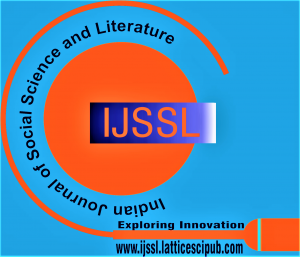![]()
Invisible Minorities – Queer Identities and Experiences in India
Anurag Paul
Anurag Paul, Scholar, Department of Political Science, Indira Gandhi National Open University (IGNOU), Kolkata (West Bengal), India.
Manuscript received on 22 November 2024 | First Revised Manuscript received on 24 November 2024 | Second Revised Manuscript received on 18 February 2025 | Manuscript Accepted on 15 March 2025 | Manuscript published on 30 March 2025 | PP: 1-6 | Volume-4 Issue-3, March 2025 | Retrieval Number: 100.1/ijssl.B115404021224 | DOI: 10.54105/ijssl.B1154.04030325
Open Access | Ethics and Policies | Cite | Zenodo | OJS | Indexing and Abstracting
© The Authors. Published by Lattice Science Publication (LSP). This is an open-access article under the CC-BY-NC-ND license (http://creativecommons.org/licenses/by-nc-nd/4.0/)
Abstract: The interpretation of history is a fascinating tale, with each scholar presenting their narratives and theorems. No matter how diverse their approaches may be, most of them may agree that in each historical epoch, there have been social divisions that stratified people into majority and minority groups, one having power over the other (Marx and Engels, 1848) [6]. However, the state has seldom ventured outside the realm of binary sexes to identify the oppression or emancipate the gender-deviant (LGBT+) individuals who, from the beginning of modern civilisation till date, have been the invisible minority. Their invisibility has been a result of a saga of lies, lies about gender identity being a mental disorder, lies that gods will punish them in hell, lies that have been fed to the masses by elites in power to hold power. The result of such lies have aggravated in forms of hate crimes, homicide, suicide and mass murders. Even though there have been specific reforms towards social modernization in the Global North that have provided for a more inclusive society for homosexuals, the condition remains intensely bitter if not uninhabitable in the Third World. Being on the traditional side of development, the Eastern mind is neither accustomed nor open to the Western form of progress. It needs an endogenous change concerning the inclusion of non-traditional genders. This paper employs a case study approach to analyze the politics behind the status of the lesbian, gay, and bisexual population in Indian society. It aims to identify the causes and effects of oppression on the esteemed community and deconstruct the myths and prejudices that obstruct their right to live freely with pride and dignity.
Keywords: Minorities, LGBT+, New Rights, Alienation, Colonialism.
Scope of the Article: Political
